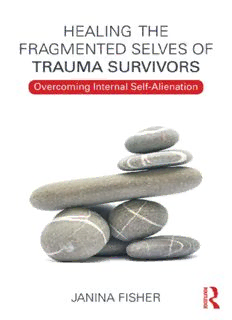
Healing the Fragmented Selves of Trauma Survivors: Overcoming Internal Self-Alienation PDF
Preview Healing the Fragmented Selves of Trauma Survivors: Overcoming Internal Self-Alienation
Healing the Fragmented Selves of Trauma Survivors Healing the Fragmented Selves of Trauma Survivors integrates a neurobiologi- cally informed understanding of trauma, dissociation, and attachment with a practical approach to treatment, all communicated in straightforward language accessible to both client and therapist. Readers will be exposed to a model that emphasizes “resolution”—a transformation in the relationship to one’s self, replacing shame, self-loathing, and assumptions of guilt with compassionate acceptance. Its unique interventions have been adapted from a number of cutting-edge therapeutic approaches, including Sensorimotor Psychotherapy, Internal Family Systems, mindfulness-based therapies, and clinical hypno- sis. Readers will close the pages of Healing the Fragmented Selves of Trauma Survivors with a solid grasp of therapeutic approaches to traumatic attachment, working with undiagnosed dissociative symptoms and disorders, integrating “right brain-to-right brain” treatment methods, and much more. Most of all, they will come away with tools for helping clients create an internal sense of safety and compassionate connection to even their most disowned selves. Janina Fisher, PhD, is assistant education director of the Sensorimotor Psychotherapy Institute, an EMDR International Association (EMDRIA) con- sultant, and a former instructor at the Trauma Center, a clinic and research center founded by Bessel van der Kolk. Known for her expertise as a clinician, author, and presenter, she is also past president of the New England Society for the Treatment of Trauma and Dissociation, a former instructor at Harvard Medical School, and coauthor (with Pat Ogden) of Sensorimotor Psychotherapy: Interventions for Trauma and Attachment. This page intentionally left blank Healing the Fragmented Selves of Trauma Survivors Overcoming Internal Self-Alienation Janina Fisher First published 2017 by Routledge 711 Third Avenue, New York, NY 10017 and by Routledge 2 Park Square, Milton Park, Abingdon, Oxon, OX14 4RN Routledge is an imprint of the Taylor & Francis Group, an informa business © 2017 Janina Fisher The right Janina Fisher to be identified as author of this work has been asserted by her in accordance with sections 77 and 78 of the Copyright, Designs and Patents Act 1988. All rights reserved. No part of this book may be reprinted or reproduced or utilised in any form or by any electronic, mechanical, or other means, now known or hereafter invented, including photocopying and recording, or in any information storage or retrieval system, without permission in writing from the publishers. Trademark notice: Product or corporate names may be trademarks or registered trademarks, and are used only for identification and explanation without intent to infringe. Library of Congress Cataloging-in-Publication Data A catalogue record for this title has been requested. ISBN: 978-0-415-70822-7 (hbk) ISBN: 978-0-415-70823-4 (pbk) ISBN: 978-1-315-88616-9 (ebk) Typeset in MinionPro by codeMantra To my most gifted teachers: All the trauma survivors who gave me a window into their inner worlds, who were my experts, who taught me what always to say and what never to say, and who, to this day, inspire me to find new ways to help them heal at the broken places. A special debt of gratitude to Barbara Watson, who taught me the importance of inspiring instead of treating, laughing instead of crying, and holding on to belief when all others have lost hope. And my eternal thankfulness to Camille for being “the wind beneath my wings.” This page intentionally left blank Contents List of Figures ix Acknowledgments x Introduction 1 1 The Neurobiological Legacy of Trauma: How We Become Fragmented 19 2 Understanding Parts, Understanding Traumatic Responses 34 3 Changing Roles for Client and Therapist 42 4 Learning to See Our “Selves”: An Introduction to Working with Parts 65 5 Befriending Our Parts: Sowing the Seeds of Compassion 77 6 Complications of Treatment: Traumatic Attachment 103 7 Working with Suicidal, Self-Destructive, Eating Disordered, and Addicted Parts 126 8 Treatment Challenges: Dissociative Systems and Disorders 145 9 Repairing the Past: Embracing Our Selves 187 10 Restoring What Was Lost: Deepening the Connection to Our Young Selves 218 vii viii Contents 11 Safety and Welcome: The Experience of Earned Secure Attachment 242 Appendix A: Five Steps to “Unblending” 263 Appendix B: Meditation Circle for Parts 264 Appendix C: Internal Dialogue Technique 266 Appendix D: Treatment Paradigm for Internal Attachment Repair 269 Appendix E: Dissociative Experiences Log 271 Appendix F: The Four Befriending Questions 272 Index 273 List of Figures 4.1 Structural Dissociation Model. 68 4.2 Recognizing Parts by the Role they Play. 69 5.1 Drawing the “Problem.” 87 5.2 Diagramming a Solution for the System. 88 ix
Description: